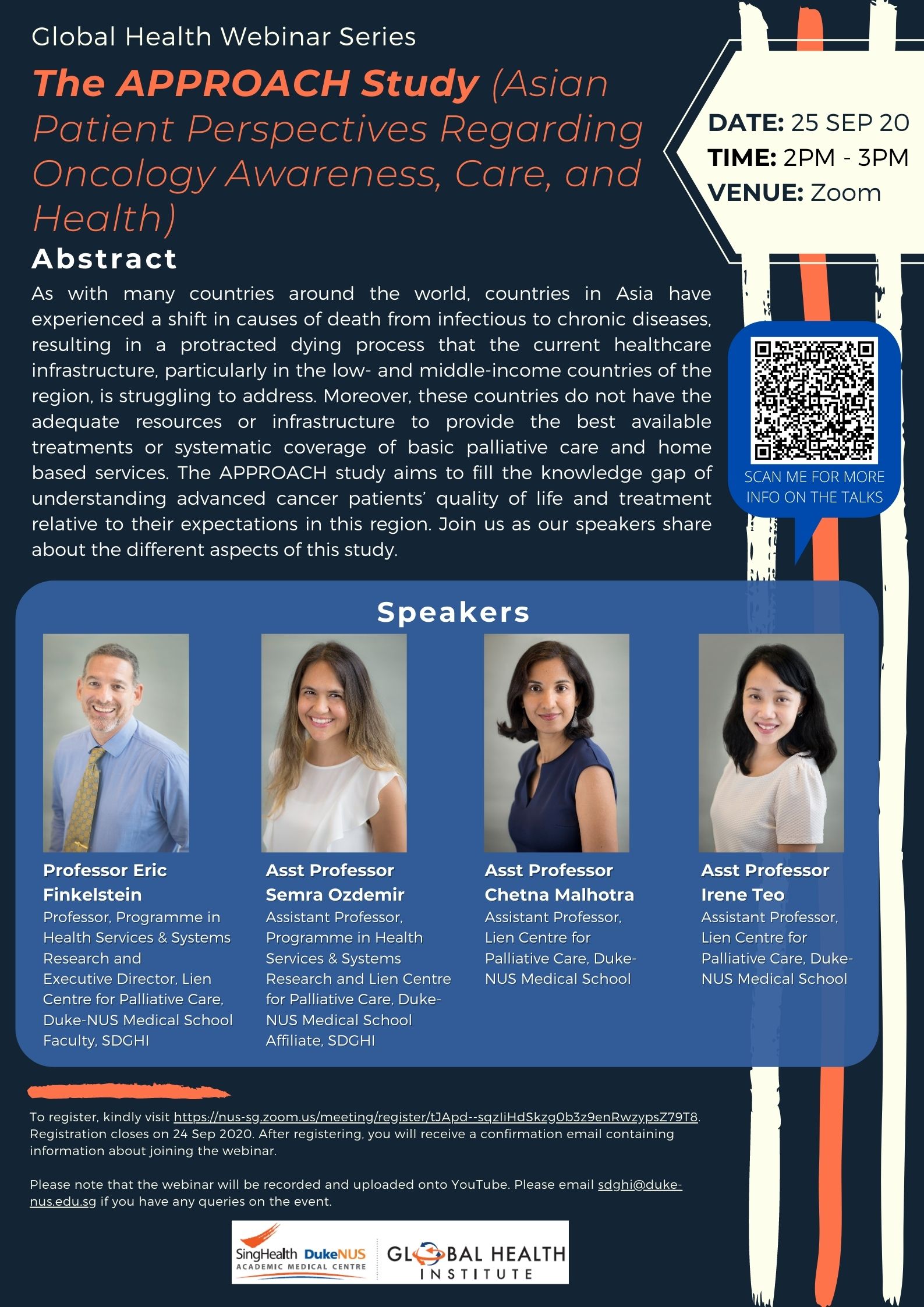Back
[GH Webinar Series] The APPROACH Study (Asian Patient Perspectives Regarding Oncology Awareness, Care, and Health)

Presentation 1:Overview of the APPROACH study & The association of self-blame with treatment preferences by
Professor Eric FinkelsteinAPPROACH is a cross-sectional survey of advanced cancer patients in 13 sites and 10 countries in Asia aiming to understand cancer patients’ perspectives on end-of-life care and treatments.
Over 40% of patients reported self-blame. Self-blame was not significantly associated with participants’ stated preference for life-extension. Patients who reported characterological self-blame were more likely to use pain medication. Therefore, developing of interventions aimed at reducing characterological self-blame might help patients receive only appropriate treatments as opposed to treatments pursued in response to feelings of self-blame.
Presentation 2:
Advanced Cancer Patients’ Prognostic Awareness and its Association with Anxiety, Depression and Spiritual Well-being & Roles in Treatment Decision Making Among Advanced Cancer Patients by
Asst Professor Semra Ozdemir
Patients with accurate prognostic awareness reported higher anxiety, higher depressive symptoms and lower spiritual well-being scores compared to those with inaccurate prognostic awareness. However, higher levels of acceptance of illness moderated these associations.
The most commonly reported role was no involvement in decision making, followed by making decisions together with family and/or physician. Male patients, those from majority ethnic groups, those with higher education, those who were aware of being diagnosed with advanced cancer and those who reported coping well with their cancer were more likely to be actively involved in decision making.
Presentation 3:Inequalities in end of life cancer care by public hospitals in low and middle income countries in Asia by
Asst Professor Chetna MalhotraWe use data from five low and middle income countries in Asia to explore differences in end of life outcomes among patients attending major public hospitals in these countries. We found evidence of inequalities in end of life outcomes by patients’ socio-economic status and age. Reducing these inequalities within public hospitals should be the focus for improving the quality of end-of-life care for advanced cancer patients.
Presentation 4:Anxiety, Depression and Mental Health Service Use Among Advanced Cancer Patients in South Asia: A Multi-country APPROACH study by
Asst Professor Irene TeoThere is a dearth of information on mental health and mental health service (MHS) use among advanced cancer patients in the South Asia region. We examined the prevalence of anxiety, depression and both anxiety-depression, and MHS use across 6 sites across India, Bangladesh and Sri Lanka. In the overall sample, 32% met threshold scores for anxiety and 47% for depression, while 24% had both anxiety-depression. The majority of patients with anxiety and/or depression (97%) have not received MHS; 38% indicated they were open to a referral.
A short Q&A session will follow the presentations.
Download event flyer here
Date and Time
25 Sep 2020 @ 14:00 - 25 Sep 2020 @ 15:00
Speaker
Professor Eric Finkelstein
Professor of the Programme in Health Services & Systems Research and Executive Director of the Lien Centre for Palliative Care, Duke-NUS Medical School
Faculty, SingHealth Duke-NUS Global Health Institute
Asst Professor Semra Ozdemir
Assistant Professor, Programme in Health Services & Systems Research and Lien Centre for Palliative Care, Duke-NUS Medical School
Affiliate, SingHealth Duke-NUS Global Health Institute
Asst Professor Chetna Malhotra
Assistant Professor, Lien Centre for Palliative Care, Duke-NUS Medical School
Asst Professor Irene Teo
Assistant Professor, Lien Centre for Palliative Care, Duke-NUS Medical School